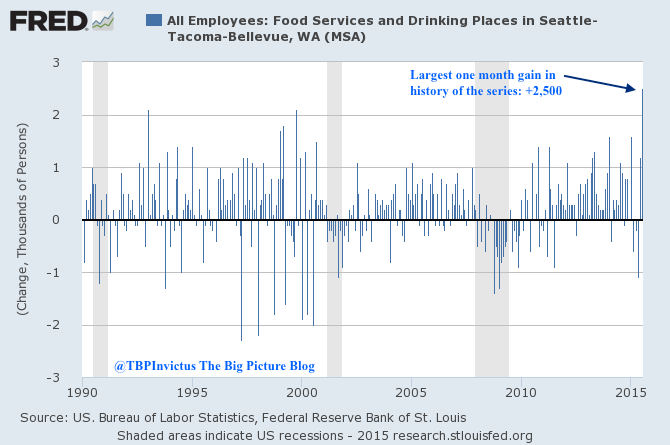Seattle-Area Restaurant Worker Numbers Are Not Actually Going Down
This doesn't mean no one is harmed by the minimum wage, for a number of reasons.
Those very worried about the month-by-month apparent empirics of the results of minimum wage hikes have had their eyes on Seattle lately. Seattle has already seen a minimum wage hike to $11, and the legal wage will be increasing by $2 increments per year, on a slower $1 per year schedule for small employers than for large ones, ending in 2020 with a $15.75 minimum wage for small employers. (There is an 85 percent of that minimum leeway for workers under 16, and certain special categories can get exceptions by going through some city hoops, including "learners, apprentices, messengers and workers with a disability.")
I've been noting prominent contributions to the controversy as they go along, here and here. The most recent had Mark J. Perry of the American Enterprise Institute using data from the Seattle MSA—"metropolitan statistical area," far larger than metro Seattle itself—to detect an enormous and unprecedented areawide fall in restaurant employment in the first half of 2015.
Now newer numbers are out, as they always shall be, and that dip is now over.
"Invictus" on the website of Barry Ritholz, a constant warrior on the "minimum wage doesn't cost jobs" tip, finds that the newest monthly data from the St. Louis Federal Reserve show the highest monthly gain in recorded history from that dataset in food and beverage services jobs in that MSA, with 3,700 added in the past two months.

The same caveats that the "minimum wages couldn't possibly cost jobs" crowd applied to Perry's initial warning about apparent job losses still applies: these are Seattle MSA numbers, not just Seattle numbers, so they don't settle anything about the minimum wage affected area in and of itself.
And month to month fluctuations in one area are not sufficient empirical evidence to make a case about an issue as huge as the empirics of the minimum wage.
"Invictus" himself says exactly as much: "I'll interrupt myself here to again remind folks that we shouldn't really be looking at this series in the first place." Indeed, I regret paying so much attention to what people have been saying about them myself.
Most importantly, there's a subtle but vital difference between saying a higher minimum wage "does not lead after passage to an overall smaller employment number in a given area" and saying a higher minimum wage "does not cause any low-skilled person to not get a job they otherwise would have had."
The former can be true even while the latter is not. And that might not matter if you just like advocating higher minimum wages because it makes you feel better that some people with jobs are getting slightly higher incomes.
But it sure matters to the low-skilled person not getting the entry-level job that could change their life.
Some bigger picture thoughts on the empirics of the minimum wage.


Show Comments (36)